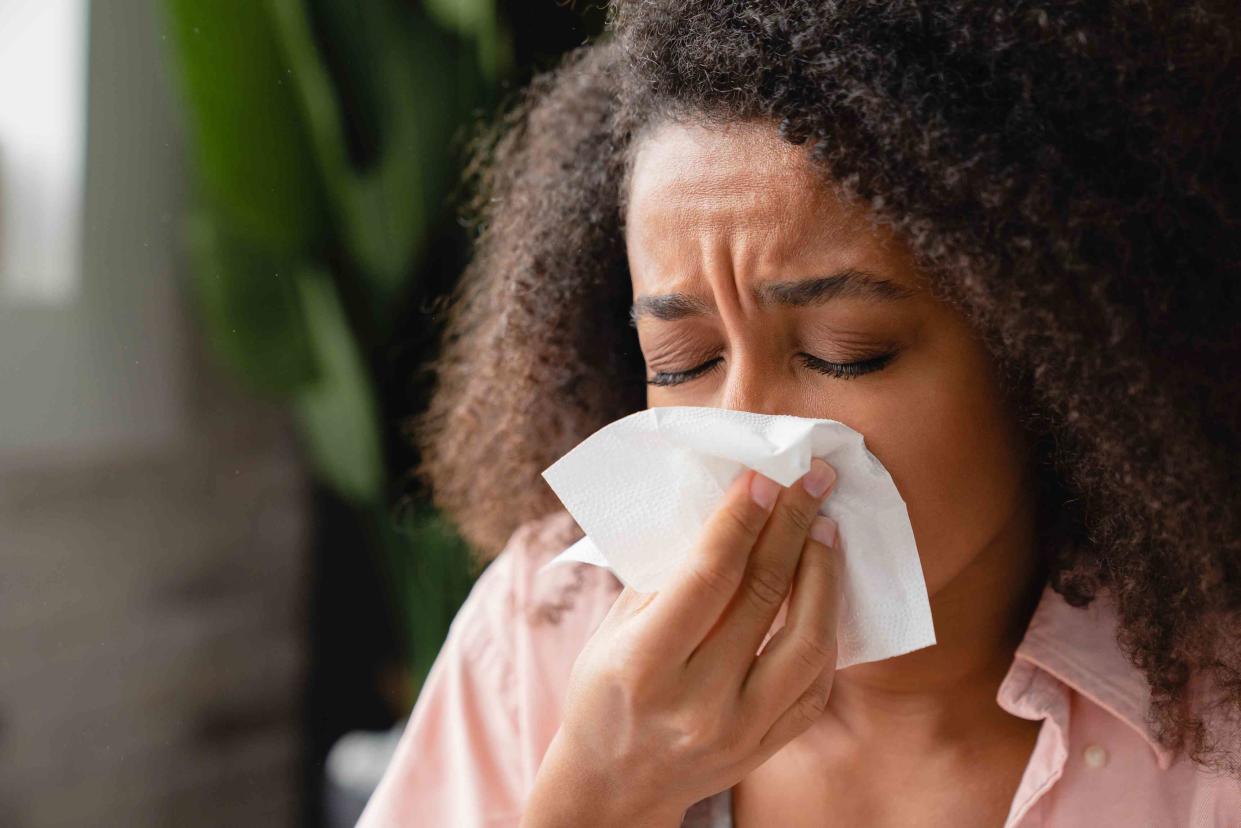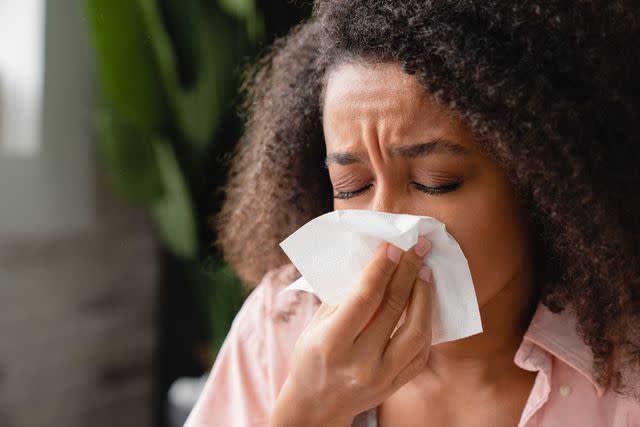What Are Allergies?

Inside Creative House / Getty Images
Medically reviewed by Daniel More, MD
Allergies occur when the immune system reacts to a normally harmless substance—such as pollen, dust, or mold—that does not affect most people.
When someone with allergies comes into contact with these substances, known as allergens, their immune system overreacts, producing antibodies called immunoglobulin E (IgE) to attack the allergen. These antibodies travel to cells throughout the body, releasing histamine and other chemicals that cause an allergic reaction.
This article explores different types of allergies, their symptoms, and ways to manage them.

Inside Creative House / Getty Images
Allergy Symptoms
Symptoms of an allergic reaction can vary from person to person. Common symptoms include:
Itchy, watery eyes
Sneezing
Runny nose
Cough
Rash
More severe symptoms that warrant a visit to a healthcare provider for treatment include:
Swelling in the mouth and throat
Difficulty breathing
Feeling faint or light-headed
Throat closing
Nausea, vomiting, or diarrhea
Allergy symptoms often overlap with viral illnesses, such as the common cold, the flu (influenza), or the coronavirus (COVID-19). If you have a cough and headache, accompanied by body aches and fever, visit a healthcare provider to rule out a virus. Colds tend to be milder and do not cause fever or body aches. They typically resolve on their own within a few days.
What Causes Allergies?
Allergies occur when the immune system reacts to a usually harmless allergen. When exposed to the allergen, the immune system tries to fight it off, similar to how it would do with a germ or virus.
While it is not well understood why allergies occur, genetics can play a role. Reactions to specific allergens, such as peanuts, are not passed down. However, parents with allergies are more likely to have kids with allergies.
Children who suffer from allergies are at a greater risk of developing asthma. Allergies can worsen asthma symptoms in children with the condition. Managing allergy symptoms can play an important role in preventing asthma attacks.
Common Allergens
Common allergens include:
Insect stings (stings from a bee or wasp)
Certain medications
Foods (eggs, milk, peanuts, tree nuts, soy, fish, shellfish, and wheat)
Seasonal Allergies
Seasonal allergies, also known as seasonal allergic rhinitis or hay fever, occur during the spring, summer, or fall when trees, weeds, and grasses pollinate.
Spring allergies are caused by tree pollen and typically occur from around February to early summer. However, over two-thirds of people with spring allergies experience symptoms yearly.
Late-spring and early-summer allergies are typically caused by grass pollen, which may cause symptoms throughout the year, especially in warm or tropical climates, where pollen counts stay high.
Late-summer and fall allergies are generally caused by weed pollen, especially ragweed pollen, which reaches peak levels in many areas of the United States in early to mid-September.
Mold spores can cause allergies in the spring, summer, and fall. They can cause allergies throughout the year for people who live in buildings with high moisture levels.
Allergy Testing to Diagnose Allergies
An allergist can help determine the specific allergen causing your symptoms by reviewing your medical history and performing skin testing or a specific IgE blood test.
During skin testing (a puncture or scratch test), a healthcare provider places a small amount of the allergen on the skin and then makes a slight prick or scratch. If the skin reacts, the person may have an allergy.
Intradermal testing is often used for allergies to penicillin and insect stings. It involves injecting a small amount of the allergen under the skin using a needle.
A specific IgE blood test measures the amount of IgE your body produces in response to a single allergen.
Related:How Allergies Are Diagnosed
Allergy Medicine and Treatment
The best way to manage an allergy is to reduce exposure or avoid the allergens completely. However, this is not always possible. Medications and treatments can help.
Prescription
A healthcare provider may recommend prescription medications if over-the-counter (OTC) medications do not relieve your allergies. These include:
Oral corticosteroids: Reduces inflammation and stops severe allergic reactions
Antihistamines and decongestants: Mostly of equal strength, with the exception of some stronger, prescription oral antihistamines, such as Clarinex (desloratadine)
Leukotriene modifiers: Blocks symptom-causing chemicals (leukotrienes); Singulair (montelukast sodium) is approved for treating allergies
Mast cell stabilizers: Prevents your body from releasing histamine and are most effective when used before allergen exposure.
Home Treatment
In many cases, allergies can be managed at home using the following at-home treatments.
Corticosteroid creams and nasal sprays: Nasal corticosteroid sprays, such as Flonase (fluticasone), work by reducing swelling and inflammation. They are considered the best treatment for nasal allergies. OTC corticosteroid creams and ointments are also available to clear rashes and relieve itchiness.
Antihistamines: Antihistamines, such as Benadryl (diphenhydramine), relieve allergy symptoms by blocking the effects of histamine. They are available OTC in pills, chewable tablets, eye drops, and nose sprays.
Decongestants: Decongestants narrow blood vessels in the nose, reducing swollen tissue. This helps you breathe more easily. Examples include Sudafed (pseudoephedrine) and Afrin (oxymetazoline) nasal spray.
Many also find relief from allergies using nasal irrigation devices, such as neti pots and bulb syringes. These devices can effectively flush the nasal passages and filter out allergens
It's important to avoid using tap water when flushing the nose. Tap water is not considered safe to use as a nasal rinse. It isn't adequately treated or filtered and can contain bacteria and protozoa. Always use sterile or distilled water when using nasal irrigation devices.
Other home remedies for allergies include:
Related:10 Natural Remedies to Relieve Allergies
Immunotherapy
Your healthcare provider may recommend immunotherapy if you have allergies triggered by environmental factors, such as pollen, dust mites, bee venom, or pet dander.
Immunotherapy exposes you to a small amount of the allergen over time, allowing your immune system to become desensitized or develop a tolerance to the allergen.
The two most common types of immunotherapy are allergy shots and sublingual (under the tongue) immunotherapy (SLIT).
What Is Anaphylaxis?
Anaphylaxis is a severe, sudden life-threatening allergic reaction that involves the whole body. Symptoms often occur within 30 minutes of exposure to the allergen. However, in some cases, symptoms can take more than an hour to develop.
Symptoms of anaphylaxis include:
Confusion
Difficulty breathing
Rapid heart rate
Slurred speech
Dizziness
Anxiety
Facial swelling
Abdominal pain or cramping
Nausea, vomiting, or diarrhea
Hives and itching
If left untreated, the condition can result in death. Anaphylaxis is treated with epinephrine (adrenaline). Epinephrine autoinjectors (EpiPens) contain a prescribed single dose of medication injected into the thigh.
How to Prevent Allergies
The best way to prevent allergies is to avoid exposure to the allergen. Depending on your allergy trigger, this may mean:
Taking medications as recommended by a healthcare provider or allergist
Avoiding certain food allergens
Exercising indoors during peak allergy season
Regularly vacuuming carpets and dusting
Installing high-efficiency particulate air (HEPA) air filters in your home and cleaning vents often
Living With Allergies
Coping with allergies can be stressful. However, identifying effective prevention and treatment methods can make symptoms more bearable and improve your quality of life.
In addition to working closely with your allergist and implementing the prevention and treatment strategies discussed, you may also find it helpful to join a support group to encourage you during tough times.

